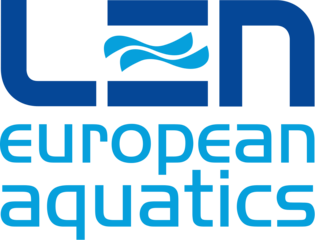What divers do
 |
Diving is a sport where the diver dives into the water from different heights and different techniques. Thereby, they do somersaults and twists, dive forward or backwards and stretch out their legs or pull them tightly into the body. People distinguish ´specialist´ diving from 1m and 3m boards, platform diving from the 5m, 7,5m and 10m platform and the synchronized diving, which is when two divers dive simultaneously from the 3m board and 10m platform into the water. Diving has been an Olympic sport since 1904.
An extreme variant of diving is that of cliff diving. Here the athletes dive off the cliffs from more than twenty meters high into lakes, rivers or the ocean. This sport combines the techniques of platform diving and the impositions of nature.
What SV Neptun offers
SV Neptun Aachen provides a wide range of offerings in place for both young and old members, from amateur athletes to cadre athletes and from beginners to professionals.
The club even gently introduces 3- to 6 years old kids to the sport. Our youngest athletes meet once a week in the " children´s group wing". There, they playfully learn gymnastics and swimming. Two trainers watch over the kids during training in the water, and they are even allowed to "dive in" themselves from the 1 m-board into the pool even if they cannot yet swim.
Most children arrive at SV Neptun while in first grade, i.e. at the age of 6 or 7 because they have found out about our club through our talent scouting done in co-operation with Aachen elementary schools. These children train twice a week in Neptun Aachen. In their second year, many athletes continue to have fun participating in their first competition. In their third year, we offer interested and talented children the possibility of increasing the training cycle to three days a week.
Many parents and children from the Aachen and the Euregio region are interested in our sport. First the children try out the drying experience during a trial training session. So athletes from Stolberg, Eschweiler, Baesweiler or Würselen have found and do find their way every day to the Ulla-Klinger hall. Some children even come from Belgium to our club. We also welcome athletes and cadre athletes to our courses during the school holidays from all over NRW. Many come from other bases in Cologne, Münster and Duisburg to work out with our coachs and to make use our unique jump and dry hall.
Athletes who practice diving as a competitive sport and regularly participate in competitions have the possibility to undertake their training sessions during weekdays and even at weekends and during the school holidays. Some athletes have a training schedule of up to 18 hours per week. They periodically travel to German and international competitions. Our two full-time A-licensed coaches take care of juniors and teenagers with tremendous care and encourage them to reach an extremely high athletic level. The success of this work can be seen when compared nationwide.
Those who aren´t looking for a competitive sport or simply want to slowly introduce themselves towards the sport, are welcome in the club´s hobby group or the introductory group. Here the children and teenagers train once or twice a week. They have lots of fun and commit themselves during the dry training in the gym hall and yet are "twirling" very respectable divers into the water. The children in the introductory group will gradually become acquainted over time with the competitive aspect of the sport.
Two evenings per week Young Adults Masters training takes place in the diving hall. This is focused on former and still-active professionals or parents who have come to enjoy diving through their children .They meet, sweat together and train with a huge amount of good humor. Some athletes practice their hobby here; others work professionally and achieve still great national and international success in competitions.
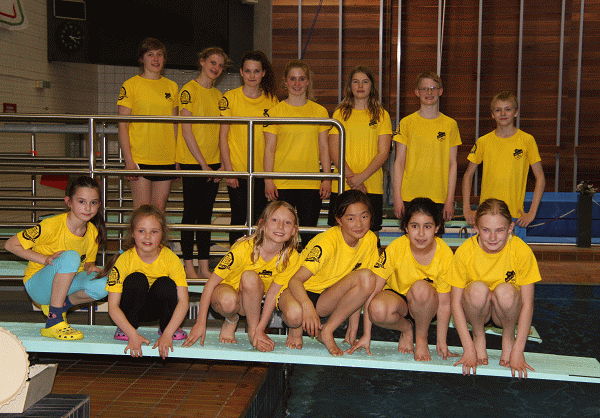 |
| Some SV Neptun athletes join together - from youth up to screening cadre |
Who we are
SV Neptun 1910 Aachen has more than 500 affiliates and is one of the traditional, largest clubs on Aachen' s club environment. Its affiliates are divided into four sections: About the half of them participate in the discipline of diving, while the remainder are involved in volleyball, synchronized swimming or water polo.
While the Board of Directors is in charge of all topics referring to the club and overviewing all the departments. The director of the diving section organizes all things relevant things to our divers. See our board for the members curretly in it.
 |
Both financially and organization- wise, a support club provides its assistance to the diving department. The Executive Board of the Club of Friends and Sponsors of the SV Neptun 1910 Diving School, Aachen is composed of
| 1st Chairman Dr. Anke Marx | |
| Deputy chairman Tanja Schweig | |
| Treasurer Bernd Elbern | |
| Secretary Franz-Josef Kiefer |
However, the daily work is basically thanks to the voluntary dedication of the parents and the association´s many friends. There is no substitute for this labour and it is definitely the centerpiece of this club. We take the opportunity at this point to thank all those who collaborate, co-create, prepare, decorate, clean, act as a taxi service, go shopping, cook, bake, clean, wash, take photos and videos, contribute with great ideas and positive suggestions etc.etc.
How it all began
As early as in the 8th century BC the sport of diving was first mentioned in Homer's Odyssey. Researchers found a picture of a diver from the year 475 BC in Paestum, Italy. Diving as a modern competitive sport evolved as far back as the 18th century in Germany and Sweden. The world's first diving club was founded in 1840.
Then in 1899, the first, albeit unofficial world championship, took place in Sweden. With the admission of diving into the 1904 Olympic Games programme, the sport then spread to many other countries. Since 1921 women now also participate in competitions. The international umbrella association, the FINA, was founded in 1908. The European umbrella association is the LEN.
In 1929, the SV Neptun Aachen Divers School was established. After the Second World War, interested students were won over for the club.
Male and females divers of the SV Neptun Aachen soon obtained their first important national and international successes. Training was first carried out in the East Hall. Due to the fact they were lacking a 10m tower, the tower training had to take place in the national training centre in Cologne for many years.
With the participation of Neptune divers, Renate Piotraschke and Ursula Möckel at the 1976 Olympic Games in Montreal, and the bronze medal achieved by Ralf Schepers at the European Youth Championships in 1976, the decision was quickly taken to add on a 10 m tower in the West swim hall West (today's Ulla-Klinger-Halle) when it was being planned. It was opened in 1977. Ten years later, with the construction of the dry diving hall, the training facility was raised to an international level.
After the unification of Germany, the aim in the 90s was to retain this under the new conditions as the only remaining federal base in the western federal states against the five federal diving bases in the eastern federal states.
A full-time professional coaching team was built up via an intensive talent scouting at Aachen´s elementary schools. It was introduced for the scholastic promotion of young talents for male and female cadre athletes and the part-time residential school of the West swim hall was founded.
Athletic successes were forthcoming. Apart from countless DM-titles at Junior Championships, in the open class and numerous medals at the Youth European and Youth World Championships, the Neptune talent Sascha Klein became the first German diver to win a World Cup in Beijing 2007. Pavlo Rozenberg became the first Olympic medal winner of any Aachen diver, who together with his Berlin partner, Patrick Hausding participated in the 2008 Olympic Games in Beijing and won the first Olympic medal - a silver in the synchronized platform diving.
Despite these top performances and achievements, the public sector has increasingly fallen. By revoking this as a federal base in 2012, federal funding fell away. Gradually, the major part of state funding was cut until 2015.
Nevertheless, a highly motivated trainer team supported by the club and the parents could lead to new talents from Aachen to success: Our youth has already upgraded in 2014 as in 2014 from D to A youth at the respective German championships and won more than 20 medals for Aachen..... 9 of them were gold medals! The reward has been quick in coming: The German Swimming Federation, the DSV, has awarded SV Neptun Aachen the quality certificate "DSV youth talent base" in the summer of 2015.
Every day 100 club children still train - highly motivated and extremely committed - and dive for Aachen. This rarely happens in Germany a second time.
Where we find our talents...
SV Neptun Aachen acts as an official talent base every year under the context of a project promoted by the state of NRW, the Swimming Federation NRW and the state sports association. This takes place between the autumn and Christmas holidays and about 600 children first graders from primary schools in Aachen are considered. In consultation with the schools, classes are individually invited to a gymnastics and training session at the training facilities.
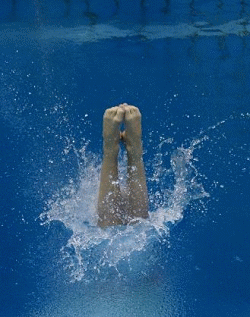 |
Upon completion of these selection sections then approximately 150 of most suitable children deemed by our trainers receive the offer of a free one-year training programme. As a rule, around 50 children participate in the training annually, which consists of sessions of two hours twice-weekly and is recognized as extracurricular lessons. Club affiliation is not required in order to participate in this programme.
After the first year, the groups have mostly been reduced to 40 or 50 percent of the original male and female participants. Children who are still interested then continue their training as club members with the same time intensity (two hours, twice a week). Then at this time they will usually participate in the NRW Divers´ day and their first cadre selection.
As from the third year on, the male and female athletes opt to continue their training in a high-performance sport- or in a mass sporting group. The training volumes increase individually and overall significantly. The aim of the talent search or talent promotion is to prepare in each case two or three boys and girls from among the 10-11 bracket and train them to successfully participate in the annual DSV selection competition. Out of this group we also achieve cadre athletes.
... and what they must do
Requirements for entry into diving are for example the physical stature, general agility and courage. However, nobody needs to be able to swim, because the children will learn with us in the team.
Later on, the trainers evaluate the how far the training has come and the results in competitions decide on how far an athlete can actually evolve. The competitions will be take place both in the water as well "on land", i.e., the athletes must measure their performance in pushups, handstands, trampoline and gymnastics. Thereby, the trainers examine the overall physical and athletic requirements necessary for diving.
Who conditions the athletes´ bodies
At the state's performance base in Aachen, the entire professional athletic development will be undertaken, beginning with the talent search up to the basic and high-performance training. To accomplish this task, there are two full-time coaches and several exercise specialists.
Since indeed the federal and state resources, as well as those of the head associations, have been almost completely cut off, SV Neptun Aachen finances its coaches by itself - with enormous effort and commitment and thanks to great sponsors and donations. Funding also takes place by offering courses, German and NRW Championships and international competitions such as the Ulla-Klinger Cup in November of each year. In these competitions, the club can rely on a large staff of voluntary employees.
Where the athletes train
The Ulla-Klinger hall forms part of one of the most compact and best-equipped training and competition facilities for divers worldwide. Over the years, the state´s performance base in Aachen has received huge investment and continuous modernization. Today the athletes, apart from the diving pool with its platforms and boards, have access to a dry training hall, a gym and a weights room.
The equipment at the diving pool includes
-
a diving tower with a 70 cm board and two 3m boards as well as a 1m, 3m, 5m, 7,5m and an extra-large 10m platform,
-
two individual 1m boards,
-
an adjustable 1m to 3m synchronous hydraulic system,
-
a bubble system,
-
two large trampolines with mats,
-
longes,
-
a grand stand,
-
an installation for the judges with a digital results display.
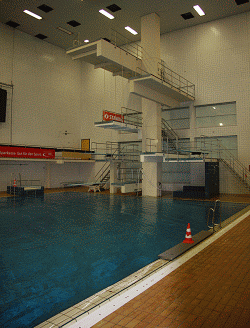 |
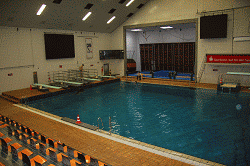 |
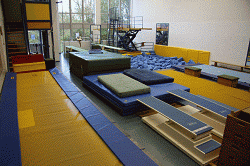 |
The dry diving facility includes
-
an adjustable 1m to 3m platform with landing pit,
-
a 1m board with landing pit,
-
a 1m board with mats,
-
two acrobatic courses,
-
a trampoline course,
-
two bounce boards with mats of various sizes,
-
wall bars and pull-up bars.
The annex consists of
- an ultra-modern gym tailored to the needs of the divers,
- an equipped meeting room, which can also be used for recreational purposes,
-
a kitchen,
-
a classroom for the part-time residential school,
-
a coach´s office,
-
a recreation room,
-
a sauna for quicker recovery after intensive training phases and competitions,
-
four bedrooms with a total of 16 beds for people participating in courses.
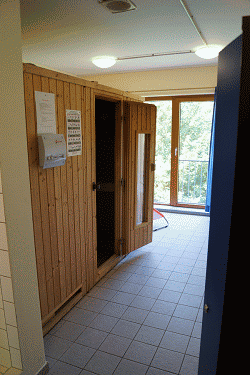 |
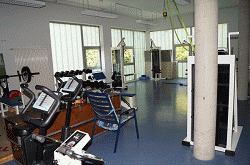 |
.
Where the students learn
The part-time residential school at the state´s performance base in Aachen has existed since 1999 and was established with the help of the state of NRW, which pays the teachers working there. The annex houses very good conditions for teaching.
Some athletes come directly after school into the part-time residential school, to warm up their lunch in the kitchen and eat. Those who eat their lunch at home or in the school canteen, visit the part-time residential school even before training.
The cadre athletes receive homework assistance, tutoring and support classes to keep them up to date at college or to catch up on schoolwork after courses and competitions. The teachers are paid by the state of NRW and provide lessons in mathematics, English, German, French, Latin and Spanish.
This form of partial residential school has been very successful, because to date the number of athletes wasn´t sufficient to form a sports class at our partner school of competitive sports, the Couven-Gymnasium - nor indeed at any other school.
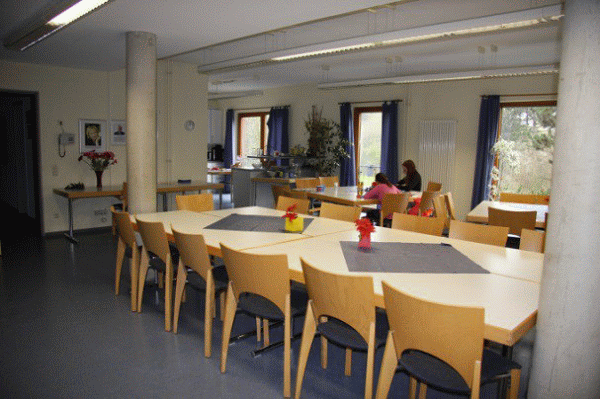 |
How much the parents muck in
Many parents support our club voluntarily by helping out tirelessly on all fronts: competitions in the Ulla-Klinger hall and also for courses and club parties. Meanwhile, the parents independently organize things with young adult athletes and take over many small jobs and repairs. Their commitment and solidarity is unique and exemplary and this is something the club's management and the coaches value intensely.
We welcome all nations
For us, we see it as a special concern to help integrate children with a migrant background into the club, because according to our experience, sport overcomes all language and cultural barriers. Children and parents of all nationalities interact extremely well at our swim hall and learn a lot from each other. International competitions such as the annual Ulla-Klinger Cup attracts athletes from China, Russia and Belarus and this also encourages goods exchange within Europe and across European borders.
For example those who immigrated as children of ethnic German immigrants from Russia to Germany have been training for many years at the state´s performance base in Aachen. During their integration, which was not always smooth and straight forward, especially if they lived in a colony characterized by social tensions, sport has helped. During the integration and overcoming of conflict our coach, Alexander Neufeld, was always assisted by the fact that he had come to Germany years before as a late repatriate from Belarus.
Also, the Afro-German Pascal Skibba is a good example of integration via the sport: He was born in Benin and came to Aachen at the age of six year as the adopted child of a German aid worker. Through our talent scouting process he joined SV Neptun. In 2002 he was the only coloured person among Germany´s divers. He was multiple German youth champion and participated in a YEM and YWM. He was repeatedly discriminated against on his train rides between his home and the training site, something he overcame again and again through his supportive sports environment.
We help socially-disadvantaged families
The club supports individual socially-disadvantaged families, whether they live by Hartz IV or have numerous children on a low income. We help with a travel costs subsidy for the children who practice competitive sports, they don´t have to pay the monthly membership fee via club subsidies for training courses.
Last but not least: We also need to celebrate
Each year the club´s diving section organizes as many summer parties and a Christmas celebration, especially in order to honour the male and female divers and their coaches for the successes of the current year. The large meeting and recreational room in the annex of the Ulla-Klinger Hall offers the most wonderful atmosphere. The Gerda-Nadenau Hall is also used for leisure activities, as well as anniversary and birthday parties of athletes and staff members alike.
Fotos: MAD, vrs, TS











